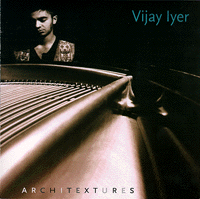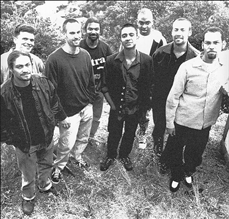a r c h i t e x t u r e s
You are your ancestors
Trapped in this dimension
Reborn in another form
So finish your mission
-- Imhotep

"...SUPERB...
A distinctive and adventurous amalgam of music that
tells stories, provokes thought, and takes the listener on spirited journeys."
Dan Ouellette, The East Bay Express
more reviews of Architextures
 left to right:
left to right:
Jeff Brock, acoustic bass (trio; octet, stereo left)
Eric Crystal, tenor & soprano saxophone (octet, stereo right)
Brad Hargreaves, drums (trio; octet)
Rudresh Mahanthappa, alto saxophone (octet)
Vijay Iyer, piano
Aaron Stewart, tenor saxophone (octet, stereo left)
Liberty Ellman, guitar (octet)
Kevin Ellington Mingus, acoustic bass (octet, stereo right)
- Prelude: Paradise Lost (solo piano)
- Meeting-Of-Rivers (octet)
- Microchips & Bullock Carts (trio)
- Charms (trio)
- Sadhu (octet)
- Three Peas (octet)
- Trident (trio)
- Taste the Sea (octet)
- Los Ojos (trio)
- Utopia of a Tired Man (octet)
- Journey over Sands (octet)
- Postlude: Prayer (solo piano)
All compositions by Vijay Iyer (Multiplicity Music - SESAC).
Recorded August 5, 1996 (trio/octet) and September 4, 1996 (solo) at OTR Studios, Belmont, California, by Cookie Marenco.
Mixed September 4 and October 3, 1996 at OTR by Cookie Marenco and Vijay Iyer.
Order Architextures from Vijay Iyer
Order Architextures from Asian Improv Records
Order Architextures from Red Giant Records
The music in this collection has emerged from my ongoing efforts to document my life experiences. It depicts what I have learned as a member of the post-colonial, multicultural South Asian diaspora, as a person of color peering in critically from the margins of American mainstream culture, and as a human with a body, a mind, memories, emotions, and spiritual aspirations. As I am a member of a growing community of first- and second-generation Indians, Pakistanis, Bangladeshis, Afghans, Nepalis, and Sri Lankans in North America, my music should be received as a real outcome of this diverse community. I function not as its official representative, but merely as a single voice -- one among millions.
The neologism Architextures emphasizes the presence of multi-tiered meanings in the musical designs. For example, in many of these pieces, I found myself recontextualizing rhythmic, melodic, and drone elements from the music of my (South Indian ethnic) heritage, placing them alongside elements from the other music of my (American cultural) heritage -- primarily the legacy of African-American masters past and present. This juxtaposition reflects the continual adaptation of people's individual perspectives due to global human migration. As the child of immigrants, I claim this adaptive process as integral to my reality.
This music employs formal compositional structures and privileges improvisation, interactivity, and exchange. Through these elements are refracted emotion, physicality, and especially intuition, all of which serve as paths of access to the higher mind. If you attune your ear, I believe that you will easily perceive all of these elements.
"Prelude: Paradise Lost" functions as an initial incantation. It was created for a benefit performance for Maitri, a refuge for South Asian women who suffer from domestic violence.
"Meeting-of-Rivers" depicts the converging of streams of the eight participating musicians. It is dedicated to lord Shiva who has been addressed by this same name, and to his possible African counterpart Esu-Elegbara who presides over the crossing of paths, and to the many rivers that have functioned as beds of culture in human history, and to Duke Ellington, whose ballet The River supplied the chromatic motif that begins the piece. The cyclic structure "morphs" as rivers, cultures, and ideas do, in space and time.
I assembled "Microchips and Bullock Carts" while visiting relatives in India. During this period I was overwhelmed by, among other things, ubiquitous technological incongruities. This piece addresses the dynamics of different awarenesses in tumultuous coexistence.
"Charms" is a related composition in that it involves what I call dancing in a mine field -- dodging rhythmic obstacles as they are thrown your way. The piece employs specific pitch organizations that give it a charm-like sound.
"Sadhu" is a Sanskrit term for the holy man/sage/ascetic, who figures, like the West African griot, as a mystical, marginal, and absolutely essential character in society. It is dedicated to the memory of my great-grandfather.
The accidentally-named "Three Peas" draws from the inspiring sonic world of horn-and-drum musics from North Africa, South Asia, China, and elsewhere along the Silk Road. Rudresh's alto evokes the reed instruments found in those parts of the world.
"Trident" shares with McCoy Tyner's piece of the same name a reverence for the sea's majesty, as represented variously in Neptune and in Shiva.
"Taste the Sea" is inspired by the great warrior Miyamoto Musashi and by pianist Cecil Taylor, both of whom have plombed the depths of intuition with unflinching rigor.
"Los Ojos" came together during a trip to Guanajuato, Mexico. Its polycyclic balance draws inspiration from the great Andrew Hill.
"Utopia of a Tired Man" shares its title with an unsettling story by Jorge Luis Borges, in which a man visits an artist of a distant future. Saddled with his obsolete aesthetics, the visitor finds himself unable even to perceive his host's unfamiliar sounds and colors.
"Journey over Sands" uses polycyclic or "satellite" logic to evoke the passage of time. Liberty's guitar embodies a seeker over shifting, perilous terrain, and the saxophones form a chorus of conscience.
I conclude with a "Prayer," which has shown healing and transformative power for me. It is dedicated to the memory of my father's mother.
This music was recorded towards the end of my 24th year, a transitional time in my life. I daresay that it crackles with the promise and charisma of some of my most brilliant colleagues, all in their mid-twenties (except for young Mingus), and representing a variety of backgrounds, from Asia, Africa, Europe, and the Americas. In the liner notes to my previous album, Memorophilia (Asian Improv Records 0023), I spoke of a certain "cry" present in the sounds of many revolutionary musicians of this century. I believe that every musician on this recording also displays that cry. We ought to call it the Blues, or some Blues abstraction, generalizing this concept beyond its profound origins in African America to the multiethnic, multiperspectival Pandora's-box-of-a-culture that my generation has inherited. Armed with this sensibility, we grit our teeth, say our thanks, and move ahead.
Vijay Iyer
Berkeley, California
4 November 1997
Deep respects to...
everybody I thanked on the first album, plus Messieurs/Mesdames Abichandani, Abrams, Adams, Andrews, Bannerji, Baraka, Benedict, Berenson, Bhogankar, Bilal, Bilmes, Bose, Bowers, Brock, Campion, Chan, Chari, Cole, Coleman, Connah, Cooke, Crystal, Delgado-Groce, Dere, Desai, Ellman, Endsley, Eskin, Felix, Flynn, Fredericks, Goodwin, Groves, Hafter, Hargreaves, Harley, Hsiang, Iyer, Jaigirdar, Jenkins, Johnson, Jones, Kahlon, Kano, Kavee, Khandwala, Krishnan, Kujichagulia, Lampkin, Lampkins-Fielder, Large, Leslie, Lewis, Loper, Loveji, Lye, Mahanthappa, Marenco, Marshall, Masaoka, Matthews, Mehta, Milne, Mingus, Monroe, Naqvi, Newton, N'Krumah, N'Zinga, Orlove, Osby, Patankar, Pause, Pennathur, Phillips, Pickell, Polvere, Power, Qui–ones, Raghunathan, Repp, Richardson, Rickman, Rozul, Sardjoe, Sarkar, Sarma, Sato, Savage, Schatz, Sherrel, Shuman, Sidhu, Silvestre, Smith, Song, Sosa, Soundararajan, Stewart, Tidd, Tompkins, Uzuri, Viswanathan, Waheed, Wainwright, Wang, Werner, Wessel, White, Wilson, Wong, Wright, Yen, Yamakoshi, Yoshinaga, Zingler... Thanks for inspiring, supporting, and nurturing me in ways large and small.
Much love to my family, Crazy Special Love to my C.S.L., & boundless gratitude to the creative spirit.
Back to Vijay Iyer's home page

 left to right:
left to right: